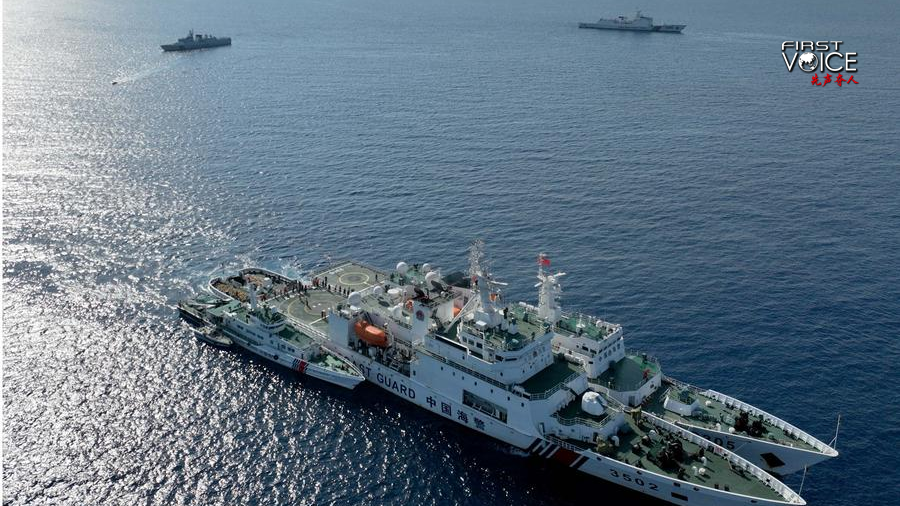
An aerial drone photo taken on May 13, 2024 shows the vessel "China Coast Guard (CCG) 3502" carrying out replenishment for other vessels in the South China Sea. [Photo/Xinhua]
By Yang Xiao
A Philippine NGO called Atin Ito, or "This is ours," has staged another provocation in the South China Sea by rallying fishermen in the waters around China's Huangyan Dao this week. Publicly available information shows that this self-proclaimed civic organization is politically affiliated and long sponsored by U.S. organizations. With U.S. backup, Atin Ito has continuously stirred up trouble in the South China Sea.
For decades, the U.S. has been offering "support" to the Philippines via Atin Ito-like organizations and repeated statements.
But is Washington's support useful?
In March, the U.S. State Department issued a statement regarding the Philippines' actions in the South China Sea. As evidenced from the overall nine statements, Washington appears determined to endorse Manila's provocations in the region. But interestingly, eight of these statements shared the same title, namely "U.S. Support for the Philippines in the South China Sea." This has raised questions about the level of effort put into their content.
More remarkably, amidst the cliched and recycled remarks, the U.S. made a highly conspicuous claim: "We condemn the PRC's repeated obstruction of Philippine vessels' exercise of high seas freedom of navigation and its disruption of supply lines to this longstanding outpost."
This claim is flawed and riddled with contradictions. By condemning China's actions to the "outpost," the U.S. tacitly acknowledges and endorses the Philippines' establishment of a "military outpost" at Ren'ai Jiao. A "military outpost" usually refers to a detached force that conducts military operations, such as surveillance, near the "enemy" during military actions.
If the U.S. supports the Philippines in establishing a "military outpost" in the South China Sea, it then contradicts its "Position on Maritime Claims in the South China Sea," which claims to "seek to preserve peace and stability, uphold freedom of the seas." The statement also implies that Washington supports changing the status quo and does not oppose other countries' establishing military outposts in the region.
This irresponsible stance of the United States is significantly undermining the peaceful and cooperative nature of the South China Sea, standing in stark opposition to China's and ASEAN countries' efforts in implementing the Declaration on the Conduct of Parties in the South China Sea (DOC) and maintaining security and demilitarization in the region. It completely exposes the U.S. as the disruptor of peace and cooperation in the South China Sea.
Washington's statement also plays tricks on its ally. If the Philippines has indeed established a "legally recognized outpost," then it should exercise "sovereignty" over it, including a territory extending 12 nautical miles, as per the United Nations Convention on the Law of the Sea (UNCLOS). Following this logic, the Philippines should not be subjected to interception in international waters. Consequently, both the U.S. and the Philippines ought to denounce China for "intruding upon Philippine territorial waters" instead of citing "disruption of supply."
Apparently, they cannot say so.
The so-called "outpost" lacks sovereignty, and thus the Philippines' construction of facilities on islands and reefs, over which it has no sovereignty, is illegal. Manila's actions at Ren'ai Jiao and Huangyan Dao are militarizing the South China Sea, and its supply-related activities are provocative.
Shouting support for its ally, Washington's statement has not only betrayed Manila's ambitions of permanently establishing a military facility in the South China Sea, but also highlighted a major contradiction in the U.S. stance on maritime law. While the U.S. vigorously advocates for the so-called freedom of navigation in international waters, the country, ironically, has not even ratified the UNCLOS. Such contradictions will be documented by the international community and may well be cited in future legal disputes.
The U.S. statement also exposes the confusion and distortion in the country's political decision-making. Its support for its ally is ironically dragging the Philippines government into an even more awkward situation. Evidently, Washington's South China Sea policy is driven by its own ambitions of expanding its clout in the region.
China's response to these provocations has been clearly articulated by Chinese Foreign Minister Wang Yi. He emphasized that on maritime disputes, China has been exercising a high degree of restraint. China maintains that parties should find solutions that are acceptable to each and all by working in the spirit of good-neighborliness and friendship, and on the basis of respecting historical and legal facts. But abusing such good faith should not be allowed. Distorting maritime laws cannot be accepted. In the face of deliberate infringements, China will take justified actions to defend its rights in accordance with the law.
Under the guise of fairness, Washington is fanning the flames of conflict for self-interest. The path to lasting peace and cooperation lies in dialogue, respect, and adherence to international laws and norms. But regrettably, Manila has chosen the wrong way that will only lead to multi-lose scenarios.
Yang Xiao, a special commentator on current affairs for CGTN, is the deputy director of the Institute of Maritime Strategy Studies at China Institutes of Contemporary International Relations.

 中文
中文



